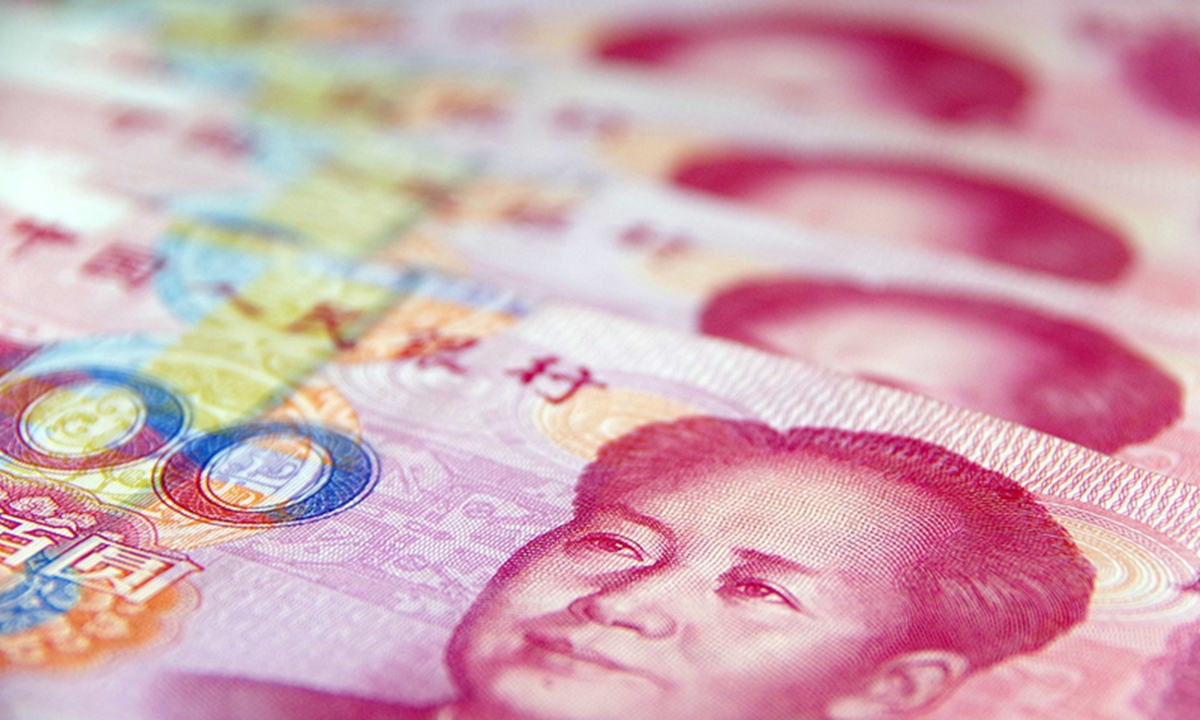
Chinese yuan Photo:VCG
The Export-Import Bank of China (China EximBank), a major policy bank in China, announced on Tuesday that it has achieved the first loan cooperation with Saudi National Bank, the largest bank in Saudi Arabia, in yuan, facilitating financial cooperation under the framework of the China-proposed Belt and Road Initiative (BRI).
The move shows the rising role of the yuan on the international stage, expanding from trade settlement to loans, an expert told the Global Times.
The funds will be preferentially used to meet the demand of China-Saudi Arabia trade projects, China EximBank said on its official WeChat account.
The cooperation is a concrete manifestation of implementation of the comprehensive strategic partnership agreement signed in person by the heads of the two states in December last year, said the bank.
As the first case of cooperation between China EximBank and financial institutions in Saudi Arabia, it will help facilitate financing and trade among countries and regions along the routes of the BRI, and achieve mutual benefit and win-win results, China EximBank added.
China and Saudi Arabia have made much progress in creating synergy between their strategies and conducting bilateral cooperation in various fields in recent years.
The Middle East country remained the single biggest oil supplier to China in 2022. Bilateral trade reached $116 billion last year, up 33.1 percent on a yearly basis.
Imports from the Middle East country stood at $78 billion, up 37 percent year-on-year, according to China's customs data.
Dong Dengxin, director of the Finance and Securities Institute of the Wuhan University of Science and Technology, told the Global Times on Wednesday that the international role of the yuan is growing, expanding from trade settlements and cross-border investment to loans.
In 2022, yuan settlements of cross-border goods trade stood at 7.92 trillion yuan ($1.15 trillion), an increase of 37.3 percent year-on-year, while cross-border yuan settlements of direct investment stood at 6.76 trillion yuan, up 16.6 percent, data from China's Ministry of Commerce showed in January.
"The loan cooperation between China EximBank and Saudi National Bank in the yuan is a good template for deals with other countries, especially in the countries and regions along the BRI routes," Dong noted.
The yuan's growing momentum in overseas markets is unstoppable with the nation's further opening-up, Dong said, adding that its influence is obviously picking up in the Middle East region, where some countries are faced with unilateral sanctions by the West.
Iraq's central bank said in February that it plans to allow trade from China to be settled directly in the yuan for the first time, in an attempt to improve access to foreign currency, according to Reuters.
"It is the first time imports would be financed from China in the yuan, as Iraqi imports from China have been financed in (US) dollars only," said Mudhir Salih, the government's economic adviser, according to a Reuters report.
Separately, an Iranian official said Iran and China have recently talked about increasing the share of their national currencies in two-way trade, given that the yuan accounts for a considerable part of bilateral trade, and de-dollarization is on the government agenda, according to Iran newspaper Financial Tribune.
Other countries such as Russia and Vietnam have also opted to use the yuan in trade settlements, an indication that the currency's internationalization not only suits China's needs but also those of more countries.
"It will be an inevitable trend for China to step up cooperation with its trade partners in the yuan as the latter will refuse to accept the US' economic coercion," said Dong.
Global Times




